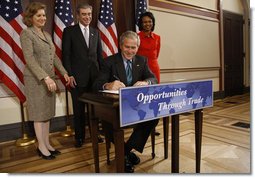
 |
For Immediate Release
Office of the Press Secretary
October 16, 2008
President Bush Signs H.R. 7222, the Andean Trade Preference Act Extension
Dwight D. Eisenhower Executive Office Building
Room 350
![]() Fact Sheet: Creating New Opportunities for Consumers and Businesses Around the World
Fact Sheet: Creating New Opportunities for Consumers and Businesses Around the World
![]() In Focus: International Trade
In Focus: International Trade
1:11 P.M. EDT
THE PRESIDENT: Thank you, please be seated. Thank you all for coming. I am pleased that legislation extending the Andean Trade Preference Act has made it to my desk, and I'm looking forward to signing this piece of legislation.
With this bill, our nation is showing our commitment to economic growth in our hemisphere -- and to a global system based upon free and open trade. And I want to thank the United States Congress for passing this bill with strong bipartisan support.
 Appreciate members of my administration who worked hard on the bill: Condi
Rice, Carlos Gutierrez, and Sue Schwab. I want to thank members of the
Diplomatic Corps who have joined us. I welcome Luis Moreno, the President
of the Inter-American Development Bank. I want to thank the members of the
congressional staff who are here.
Appreciate members of my administration who worked hard on the bill: Condi
Rice, Carlos Gutierrez, and Sue Schwab. I want to thank members of the
Diplomatic Corps who have joined us. I welcome Luis Moreno, the President
of the Inter-American Development Bank. I want to thank the members of the
congressional staff who are here.
Across the world, citizens are concerned about the financial crisis -- and they should be. And our governments are working together to address it. This past weekend, I met with the finance ministers from the G7 and G20 -- organizations representing some of the fastest- and largest-growing economies in the world. Yesterday, I joined other G8 leaders in a statement that reaffirms our commitment to resolve the crisis. In other words, we're working together. We want to make sure we're coordinated in our response. All our nations are carrying out a comprehensive plan of action to help unfreeze credit markets and restore confidence in our financial systems.
These are urgent short-term steps. In the long run, one of the best ways to restore confidence in the global economy is by keeping markets open to trade and investment. Last year, America set a record by exporting more than $1.6 trillion of goods and services. Exports now make up a greater share of our gross domestic product than at any time in our history. People find good-paying jobs when they work for businesses that export.
Opening markets benefits our trading partners. For example, this deal, this law I'm signing, will help hardworking people in countries affected. It will help people have a better way of life. We want there to be a prosperous neighborhood. It's in the interest of the United States that prosperity spreads throughout our neighborhood.
So Congress was right to pass this bill ensuring duty-free access to the U.S. market for trading partners in South America, including our friends Colombia and Peru. The Andea [sic] Trade Preference Act allows us to suspend trade preferences with countries that do not live up to their promises. And unfortunately, Bolivia has failed to cooperate with the United States on important efforts to fight drug trafficking. So, sadly, I have proposed to suspend Bolivia's trade preferences until it fulfills its obligations.
Now that members of Congress have ensured duty-free access for American -- South American products entering our markets, they also need to ensure duty-free access for U.S. products entering South American markets. Congress has a good opportunity to take a step in that direction by approving our free trade agreement with Colombia. More than 90 percent of Colombia's exports currently enter the U.S. duty free. Yet American goods sold in Colombia continue to face high tariffs. The Colombia free trade agreement would eliminate these trade barriers. It will level the playing field for America's businesses and farmers and ranchers and workers.
Seems to me it would make a lot of sense to simply asking the Congress to sign a trade deal that allows us to be treated just like we've treated other people. Unfortunately, nearly two years have passed since the United States and Colombia signed our free trade agreement. During that time, an estimated $1.3 billion of tariffs have been levied on American products exported to Colombia. These tariffs reduce the competitiveness of thousands of American companies that do business in that nation. By approving our free trade agreement, Congress can directly benefit American workers and ranchers and farmers -- and give them greater confidence about our economic future.
Congress is coming back to Washington next month. One of their top priorities should be to approve this vital agreement with Colombia -- as well as with Panama and South Korea. These free trade agreements will strengthen our relationships with key allies. They will create new opportunities for our consumers and businesses. They will reassure our trading partners that America will not give in to pessimism or protectionism. They will show that we honor our commitments.
And now it's my honor to sign the Andean Trade Preference Act.
(The bill is signed.) (Applause.)
END 1:16 P.M. EDT